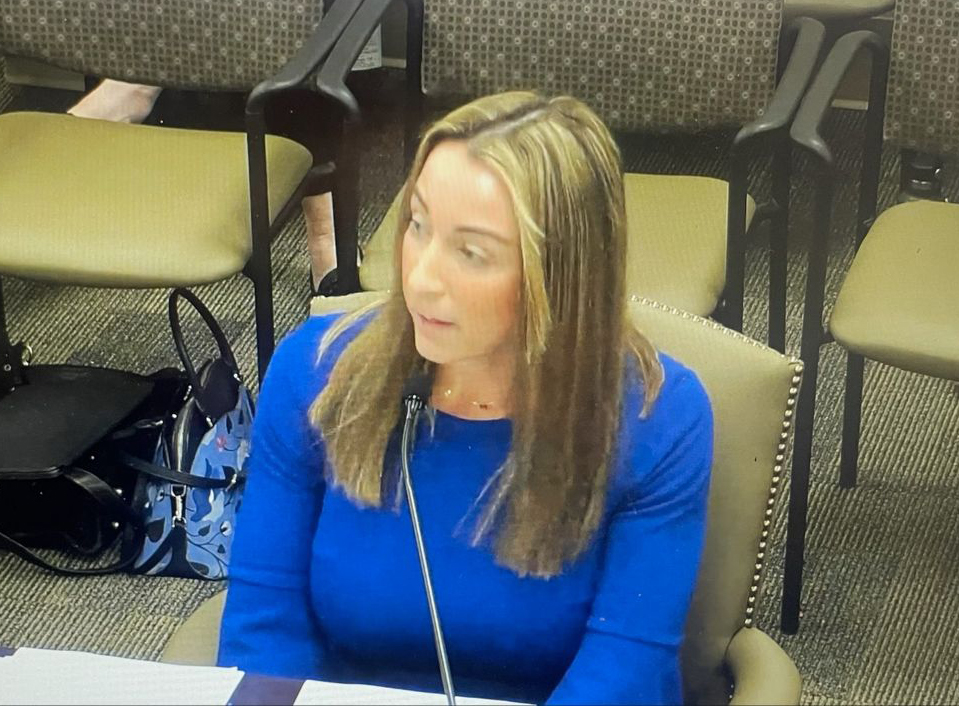
Chester County Chamber President Laura Manion during her testimony before the Pennsylvania House of Representatives.
On Wednesday, March 29th, Chester County Chamber President Laura Manion traveled to our state capitol to present testimony at the House Children & Youth Committee Informational Meeting on the Challenges with Childcare in Pennsylvania.
Majority Chair Donna Bullock and Minority Chair Barry Jozwiak opened the floor to discuss the importance of childcare as both an industry itself and as an economic power driving the decline of the active workforce. Manion was part of a panel with Angela Ferritto, President of the Pennsylvania AFL-CIO, and Alex Halper, Vice President of Government Affairs of the Pennsylvania Chamber of Business and Industry to emphasize the impact childcare has on both the workforce and the economy.
The growing issue came to a head during the Covid-19 pandemic when over 16,000 childcare facilities were forced to shut down or operate at a severely restricted capacity. This forced parents, overwhelmingly mothers, to leave their jobs to care for their children in the absence of reliable or affordable childcare. The setback to the workforce has exacerbated the current economic climate. Manion cited that 60% of all parents attribute lack of childcare as the primary reason for leaving the workforce (U.S. Chamber Foundation data). Halper added that absences and employee turnover due to child care challenges costs PA employers $2.88 billion annually and $3.47 billion to PA’s economy annually.
The Chester County Chamber of Business and Industry recognizes the importance of the childcare crisis that is affecting working families and employers across the country. The Chamber is recommending that the State’s General Assembly and Governor Shapiro Administration consider the following four policies to aid in the accessibility of affordable childcare. First, an Employee Child Care Public Partnership (P3) to incentivize employers to fund childcare for their employees by splitting the cost with the state and providing tax credit incentives to employers who participate. Second, the expansion of the Commonwealth’s Childcare Tax Credit to allow middle-income parents to return to the workforce. Third, retention and recruitment efforts, such as expanding proposed rebates and incentives to include the childcare community. Last, the Chamber is advocating for favorable regulatory changes considered by the Shapiro Administration to include input and guidance from active childcare providers without increasing costs for providers.
“This is an economic and workforce issue as much as it is a societal issue,” stated Laura Manion, CCCBI President and CEO
Other testifiers at this hearing included childcare providers who shared their personal experiences as providers and administrators in their respective businesses. They emphasized the need for childcare providers throughout the state and the challenges that face any individual in the profession, including low wages, insurance barriers, and education restrictions that are currently making it increasingly difficult to recruit and retain qualified employees. A call for additional funding was also made to aid in maintaining facilities, paying staff a livable wage and offering training and development programs, and implementing regulations to secure access to educational and legal resources to operate under optimal conditions.
The House Committee also heard from the Pennsylvania Department of Human Services, and the Pennsylvania Association for the education of Young Children, to discuss the importance of childcare as a whole. They stressed the importance of programs like Child Care Works, Head Start Supplemental Assistance Program, and Pre-K Counts. Programs like these aim to assist families with high child care fees to provide high quality child care for all, especially low-income households. Shocking results were discussed from a 2023 survey that concluded 84% of child care respondents are experiencing staffing shortages which has caused 50% to close at least one classroom leaving approximately 35,00 children on childcare waiting lists throughout 54 counties across the state. Additional funding was found to be essential for the sustainability of the childcare system, and the economy that it is greatly affecting.
Manion concluded her testimony by saying, “We, the private sector, government officials, and experts in the childcare field, must come together to address this crisis. This is a commitment to future generations that will lay foundation for a more prosperous economy.”




